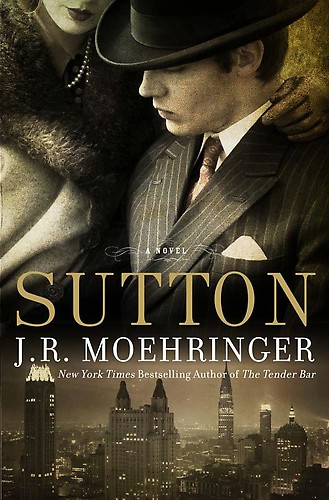
Sutton
کتاب های مرتبط
- اطلاعات
- نقد و بررسی
- دیدگاه کاربران
نقد و بررسی

July 30, 2012
Moehringer, a Pulitzer Prize winner for feature writing in 2000, brings infamous bank robber Willie “The Actor” Sutton to life in his inventive debut novel (after the memoir The Tender Bar). True to history, the ailing 68-year-old Sutton was released from prison on Christmas Eve 1969 and spent the following day with a reporter. Though the journalist’s actual take on that day revealed little, Moehringer uses the excursion as an entrée into Sutton’s dramatic life. The ex-con revisits old haunts, recalls successful and failed heists, and reminisces about the woman he sought always to impress. Alternating between Christmas Day and Sutton’s earlier years, Moehringer stays in the present tense, making the action immediate, but the shifts in time easy to miss. Nevertheless, he paints a mesmerizing portrait of a remarkable man: a talented thief, an aspiring novelist, and a student of the classics (“Dante, Plato, Shakespeare, Freud”) even in prison, where he spent half his life. The author’s eye for detail and sense of place make every stop on Sutton’s internal and external journeys resonate—from smoking a Chesterfield to Sutton’s first sight of the moon as a free man, every scene is saturated with life. Agent: Mort Janklow, Janklow & Nesbit.

Starred review from September 1, 2012
A "non-fiction novel" that takes us far beyond Willie Sutton's clever one-liners about banks and deeply into his life. Born in Irish Town in Brooklyn, Willie never quite fit into his own family. His father was a taciturn blacksmith at a time when automobiles were starting to become the rage, and Willie's brothers had an unaccountable hatred for their younger sibling. Willie was smart and sensitive but came of age during some parlous economic times and considered banks and bankers the symptom of life as a rigged game. Moehringer also depicts Willie as a hopeless romantic who falls deeply in love with Bess Endner, daughter of a rich shipyard owner. After the brief exhilaration of a robbery at the shipyard, abetted by Bess, Willie and his cronies are caught and sentenced to probation, and thus begins a life on the outside of social respectability. By the 1930s, Willie is the most famous bank robber in the country, known in part for his gentility and the way in which he approaches his craft. He's never loud or violent but instead devoted to artful disguises and making clean and quiet getaways (hence his nickname, the Actor). Not everything works smoothly, of course, for he's incarcerated for many years, but he ironically becomes something of a folk hero for breaking out of several prisons. His final release, at Christmas in 1969, following a 17-year stretch in the slammer, has him retracing his past in the company of a reporter and photographer. Moehringer cleverly presents the antiphonal voices of Willie in the present (i.e., at the time of his release) and Willie in the past to give a rich accounting of his life, including his love for the works of Plato, Aristotle, Lucretius, Freud, Jung and Joyce. Whatever else you can say about Willie, in prison he got an excellent education. A captivating and absorbing read.
COPYRIGHT(2012) Kirkus Reviews, ALL RIGHTS RESERVED.

August 1, 2012
They called bank robber Willie Sutton (1901-1980) "The Actor" because he committed many of his robberies in costume. Although he spent half of his adult life in prison, Sutton had one of the longest, most successful criminal careers ever, with crimes spanning 40 years and netting $2 million in unrecovered funds. The public loved him; Willie robbed banks, not people, and banks weren't all that popular during the Depression. He was always good copy, articulate and colorful. Writing about Willie's life has its risks: Sutton penned two autobiographies but changed his story so often that he ended up making it more confusing than it was to start. In his fiction debut, Moehringer (The Tender Bar) brings his considerable skills as a Pulitzer Prize-winning investigative reporter to the task and for the most part succeeds. The novel loses momentum toward the end, but this reflects more the murkiness of Sutton's private history than it does Moehringer's talent as an author. VERDICT History lovers will enjoy this fictional biography of a modern icon of crime. [See Prepub Alert, 6/15/12.]--David Keymer, Modesto, CA
Copyright 2012 Library Journal, LLC Used with permission.

Starred review from August 1, 2012
When Willie Sutton, the Babe Ruth of bank robbers, was released from Attica on Christmas Eve 1969, he had stolen more than $2 million from banks, engineered three dazzling prison breaks, and become a folk hero to thousands of cash-strapped Americans who had weathered three serious recessions while the banks rode high. Sutton was 68 and in failing health but agreed to do an interview. This is Moehringer's fictional take on that real-life event as Sutton, gruffly addressing the reporter and photographer as kids, is driven all over New York City, visiting the places that shaped him for good or ill. As Sutton is consumed by his memories, Moehringer (The Tender Bar, 2005) relays, in electrifying prose, the highs and lows of Sutton's dramatic life, from the thrill of the heist and his great, doomed love affair to the brutal interrogations by cops and the hell of years spent in solitary confinement. Readers will be riveted by this colorful portrayal of a life in crime spurred by a hatred for banks, but Moehringer, in his first novel, isn't content to stop there. He takes it several layers deeper, probing the psyche of an enigmatic man who had a genius for thievery and an even greater capacity for self-delusion.(Reprinted with permission of Booklist, copyright 2012, American Library Association.)

























دیدگاه کاربران